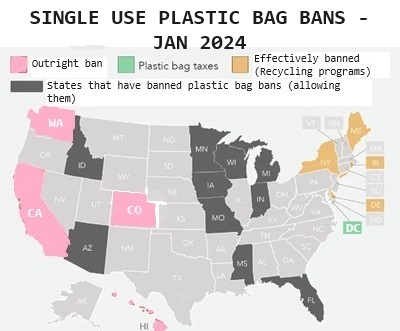New Jersey's plastic bag ban, hailed by Governor Murphy in 2020 as a progressive environmental measure, has encountered unexpected consequences, as outlined in recent reports. Despite its good intentions, the ban seems to have backfired, resulting in unintended outcomes that raise concerns. And NJ is not alone. As of January 2024, there are 12 states with outright bans of single use plastic bags.
The law, the strictest plastic bag ban at the time, banned

As of January 2024, 12 states have single-use plastic bag bans either outright or through prohibited taxes and other restrictions:
In addition, iIt is estimated that there are over 500 municipalities in 28 states with plastic bag bans as of 2021.
According to Forbes, one year after the ban's implementation on May 4, 2022, there has been a surge in plastic consumption in New Jersey. Contrary to expectations, the prohibition of plastic bags led to a significant increase in the use of other plastic products, including thicker, heavier bags that were exempt from the ban. Consumers, unable to access traditional plastic bags, turned to alternatives that often contained more plastic material, exacerbating the environmental impact instead of reducing it.
Fox News reports that. New Jersey residents have used 300% more plastic after the ban, from
consuming
53 million pounds of plastic before the law to 151 million pounds after.
The Washington Examiner corroborates this observation, emphasizing that the ban on plastic
bags in blue states like New Jersey has inadvertently contributed to higher plastic consumption. Instead of curbing plastic use, the ban has
prompted consumers to opt for alternatives that generate more waste and harm the environment. This rebound effect underscores the complexities of
environmental policies and the importance of comprehensive analysis in their implementation.
Freedonia Group reports hat not only did the total consumption of plastic increase threefold as a result of the ban, but the type of plastics used are not recycleable
In 2022, following implementation of the New Jersey bag ban, total bag volumes declined by more than 60% to 894 million bags. However, the study also shows, following New Jersey’s ban of single-use bags, the shift from plastic film to alternative bags resulted in a nearly 3x increase in plastic consumption for bags. At the same time, 6x more woven and non-woven polypropylene plastic was consumed to produce the reusable bags sold to consumers as an alternative. Most of these alternative bags are made with non-woven polypropylene, which is not widely recycled in the United States and does not typically contain any post-consumer recycled materials. This shift in material also resulted in a notable environmental impact, with the increased consumption of polypropylene bags contributing to a 500% increase in greenhouse gas (GHG) emissions compared to non-woven polypropylene bag production in 2015. Notably, non-woven polypropylene, NWPP, the dominant alternative bag material, consumes over 15 times more plastic and generates more than five times the amount of GHG emissions during production per bag than polyethylene plastic bags.
And if you think reusable bags are better, consider this: a reusable cotton grocery bag must be used 7,100 times for it to have a positive effect on the environment based on lifecycle analysis of reusable bags. Remember how artificial
Christmas trees were considered , 30 years ago, to be bad for the environment, and it has since been concluded the often last a lifetime and when
all costs (such as transportation of lives trees) are considered, the artificial tree may be better! NorthJersey.com painted a rosy picture of
the ban on May 11, 2023, but it was obviously premature in its assessment. The news story provided
additional insights into the aftermath of New Jersey's plastic bag ban. Despite initial optimism, the ban's impact has been underwhelming, with
limited progress in reducing plastic waste. Stakeholders express concerns about the ban's efficacy, highlighting the need for more effective
strategies to address environmental challenges without unintended consequences.
Collectively, these narratives paint a sobering picture of
the "Law of Unintended Consequences" otherwise known as "good intentions oft go awry". Complexities surrounding environmental legislation like the plastic bag ban are well-intentioned,
but their implementation and
outcomes can be more nuanced than anticipated. The case of New Jersey's ban serves as a reminder of the importance of evaluating and adjusting
policies to achieve desired outcomes while mitigating unintended side effects in the pursuit of a sustainable future.
Many references are incorporated into the text above, by the links to the sources. Below are additional references.
Ways to save money AND help the environment:
Eat healthier AND save money: Instant Pot Duo Crisp 11-in-1 Air Fryer and Electric Pressure Cooker Combo with Multicooker Lids that Fries, Steams, Slow Cooks, Sautés, Dehydrates
Save water AND money with this showerhead adapter, it lets the water flow until the water is hot, then shuts off water flow until you restart it, ShowerStart TSV Hot Water Standby Adapter
Protect your health with these:
Mattress Dust mite-Bedbug protector, 100% Waterproof, Hypoallergenic, Zippered
Handheld Allergen Vacuum Cleaner with UV Sanitizing and Heating for Allergies and Pet, Kills Mite, Virus, Molds, True HEPA with Powerful Suction removes Hair, Dander, Pollen, Dust,
Immune Support Supplement with Quercetin, Vitamin C, Zinc, Vitamin D3
GermGuardian Air Purifier with UV-C Light and HEPA 13 Filter, Removes 99.97% of Pollutants
5 Stage Air Purifier, Features Ultraviolet Light (UVC), H13 True Hepa, Carbon, PCO, Smart Wifi, Auto Mode, Quiet, Removes 99.97% of Particles, Smoke, Mold, Pet Dander, Dust, Odors
Interesting Reads:
THE PREPPER'S CANNING & PRESERVING BIBLE: [13 in 1] Your Path to Food Self-Sufficiency. Canning, Dehydrating, Fermenting, Pickling & More, Plus The Food Preservation Calendar for a Sustainable Pantry
The Backyard Homestead: Produce all the food you need on just a quarter acre! Paperback
The Citizens' Guide to Geologic Hazards: A Guide to Understanding Geologic Hazards Including Asbestos, Radon, Swelling Soils, Earthquakes, Volcanoes
The Uninhabitable Earth: Life After Warming
Book: The Sixth Extinction: An Unnatural History Paperback